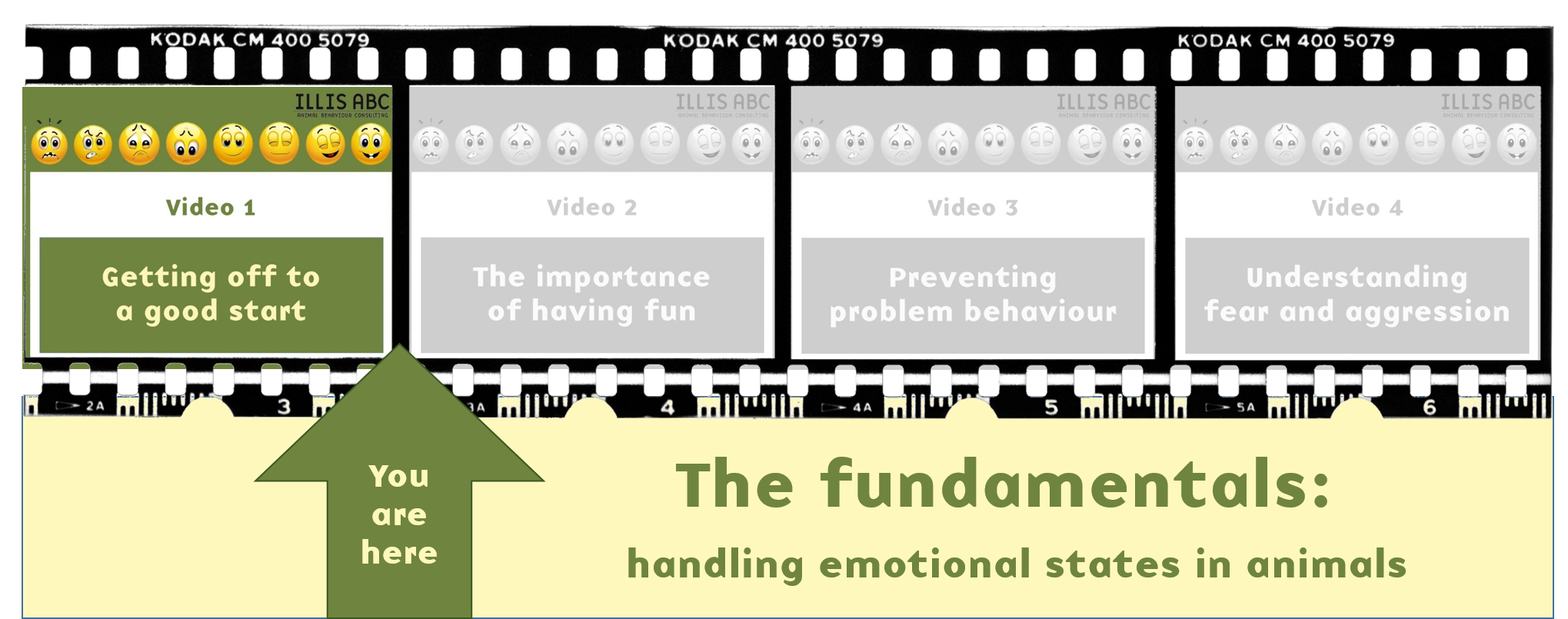This course is unfortunately closed. If you’re already a student, sign in here. If you’re a pet owner, or work professionally with animals, you will benefit a lot from The Fundamentals, and your animals – today’s and tomorrow’s – will thank you! “The Fundamentals” is a short introduction to how emotional experiences impact animals’ personality, social skills and stress sensitivity – and what you can do to guide this process. But don’t take my word for it – see what others are saying! “I loved your course! It was so interesting and helpful. It has already helped me with my nervous dog. I have been playing with him much more and he is sleeping better.” – Charlie “… a great dose of inspiration and pointing out what is important in a clear illustrative way!” – Liis “This is truly something every animal owner should learn.” – Amanda This short course will help you get a happy animal that wants to be with you. See for yourself. Here’s the first (and longest) part of it – for free! Just press the “cc” button to the bottom right and choose. Many people have found that video really helpful! Understanding the impact of emotions on personality, welfare and the quality of relationships can transform your life with animals. There are three more parts to this “Fundamental” series, though. In the second part in the training, you’ll learn about the importance of having fun. Why allowing your animals to play, especially when they’re young, is hugely important. In the third part, you’ll learn how to prevent problem behaviour by taking one specific core emotion into consideration, and in the fourth, how understanding fear and aggression can help you prevent and reduce its harmful effects. “The Fundamentals” is a short training (45 minutes) – a condensed outline of this topic – but one that many people have found very useful. Here’s what others are saying about “The Fundamentals – Handling Emotional States in Animals”. “WOW – love love love!!” – Jette “Your teaching style is accessible and compelling, and the content is unique amongst animal training videos in my experience.” – Alison “Your courses are so fascinating, eye-opening and important.” – Katarina “Wonderful videos. Very useful information for animal trainers and pet owners alike.” – Sarah “I love this series, it is so accessible and enjoyable.” – Jessie “These videos are amazing! … This is a topic I find really fascinating and necessary. Especially since so many people simply don’t belive animals have feelings at all.” – Johanna “I love your way of giving “heavy” information in a “light” and interesting way.” – Aino When you become a student, I’ll also keep you posted on my upcoming free webinars, masterclasses and other courses, as well as when I publish new blog posts about animal behaviour, training and wellbeing! As a student, you have access to it for 6 months, so you can learn at your own convenience – and watch the 4 videos any number of times. All four videos are subtitled in English and Swedish. Local taxes may apply depending on where you live. This course is unfortunately closed. If you’re already a student, sign in here.  Note that you can choose whether you want subtitles, or captions:
Note that you can choose whether you want subtitles, or captions:

35 replies on “The fundamentals – handling emotional states in animals”
Really enjoyed this. Look forward to the next one.
thanks! 🙂
Nice refresher after taking the full Animal Emotions Course, and great preview for anyone who hasn’t taken it. So much good food for thought!
Good to hear that it wasn’t boring then, even if you’ve taken the full course..!
really interesting
Thanks, Janet! 🙂
Really enjoyed these. thank you
You’re welcome! 🙂
I don’t see the prices listed for your courses? Emotional stages in animals
Hi! The short course “The Fundamentals of Animal Emotions” is 9 dollars, and the full course “Animal Emotions” is currently unavailable, but will reopen in October for a short time; that was priced at 247 dollars last year.
Thanks. I was wondering when the full course would be offered. Loved this short course.
The full course will be on again sometime September/October! 🙂
This has helped me to look at the fostering environment for the cats in the care of the cat charity that I volunteer for. I am trying to enrich the environment for the cats by encouraging more play, foraging and some clicker training.
Do you only accept PayPal?
Nobu, if you check carefully you’ll see that you can pay either by logging into your paypal account, or by card. 🙂
I have watched the first two videos so far, and I love them. I have a puppy who was rescued from the city streets with his mother and littermates when he was around 4 weeks old. So, he did not have a mother who was in a safe place to raise him. Probably due to that, he is fearful and tense, prone to reactivity toward strangers. I now have started making sure that I spend time each day massaging him and playing with him daily. When he is stressed, I can instantly see how these sessions help him calm down a bit. I am looking forward to the next two videos, and I hope to take the full course if it opens up again.
Great to hear – fabulous! 🙂
Great, clear and specific content! Loved it!
🙂
Good evening. Thank you for a very interesting course. I am currently studying for my diploma in companion animal behaviour and this course has been most helpful. I did not see the link for the full course? Do you have any information on hedonic budgets?
You’re welcome! The full course is closed presently, opens again September/October 2021! About hedonic budgets, I don’t have any good resources that I can think of, but I know that in the EMRA methodology they use it a lot! https://www.amazon.com/EMRA-Intelligence-Robert-Falconer-Taylor/dp/0857880160#ace-g7448806443
check into cash payday loan no credit check payday advances same day as cash loans
Thank you Karolina. The videos were very interesting and helpful. Now I’ve a bit more understanding on how to approach clipping the nails of my 5 month old puppy, as well as other situations that he’ll need to come across in his life.
Glad you found it useful, Jane! 🙂
Love this work and these ideas.
Unlike some other methods of ‘training “ does not leave the care giver stressed out.
I’m speaking purely as a dog care giver, not as a pro.
Thanks for the feedback, Deanna! 🙂
When I open to register, the webpage only proposes to pay through paypal, I would need to create an account. I see from other replies that there should be another card option, but my eyes cannot distinguish it. :-/ Does it appear through another click or it goes straight through the paypal option?
Hi Helen, PayPal is processing all our payments. You can use your debit- or credit-card.
In some countries you can pay without creating a login account with PayPal, in others it is required. In either case there is no need to transfer any money to Paypal to sign up to the course.
All the best, /tobias
Thank you!
Hi karolina, I found this minicourse really interesting and helpful. I have horse who was badly beaten by a trainer a year and a half ago. I had had her a year she had never put a foot wrong. After the beating she was rearing napping etc. I have worked v slowly to rebuild her confidence and trust in me. She is 90% there , well 75/80%!! But has an occasional explosion- which is v dangerous for me – I think she basically has PTSD and if there is stacking she cannot cope and explodes. Ive read quite a lot and am in my 60s and had a lot of experience with horses. Which of your courses would you recommend or do you know of any books that would help. I’ve done some clicker training, playing with balls , standing on stuff for rewards- groundwork and basic riding. Thanks Jean
Hi Jean, glad you found the course helpful! Unfortunately such one-trial learning can really be difficult to handle! I would recommend either my Animal Emotions course (January 2024) or the Resolving Challenging Behaviour course (September 2023) – or you can look into MHERA – mood matters by Karin Pienaar.
https://www.amazon.com/Mood-Matters-Innovative-Assessment-Emotionality/dp/161781332X
Best of luck!
Thank you so much will follow those tips, jean
💗
This course was like the last piece of a jigsaw puzzle. Finally, I got to understand (I think) why operant conditioning works. Finally, I got to comprehend why some things I did with the dogs I trained worked even when they were not in the procedure books. Thank you very much!
You’re welcome – so glad you found it useful! 🙂